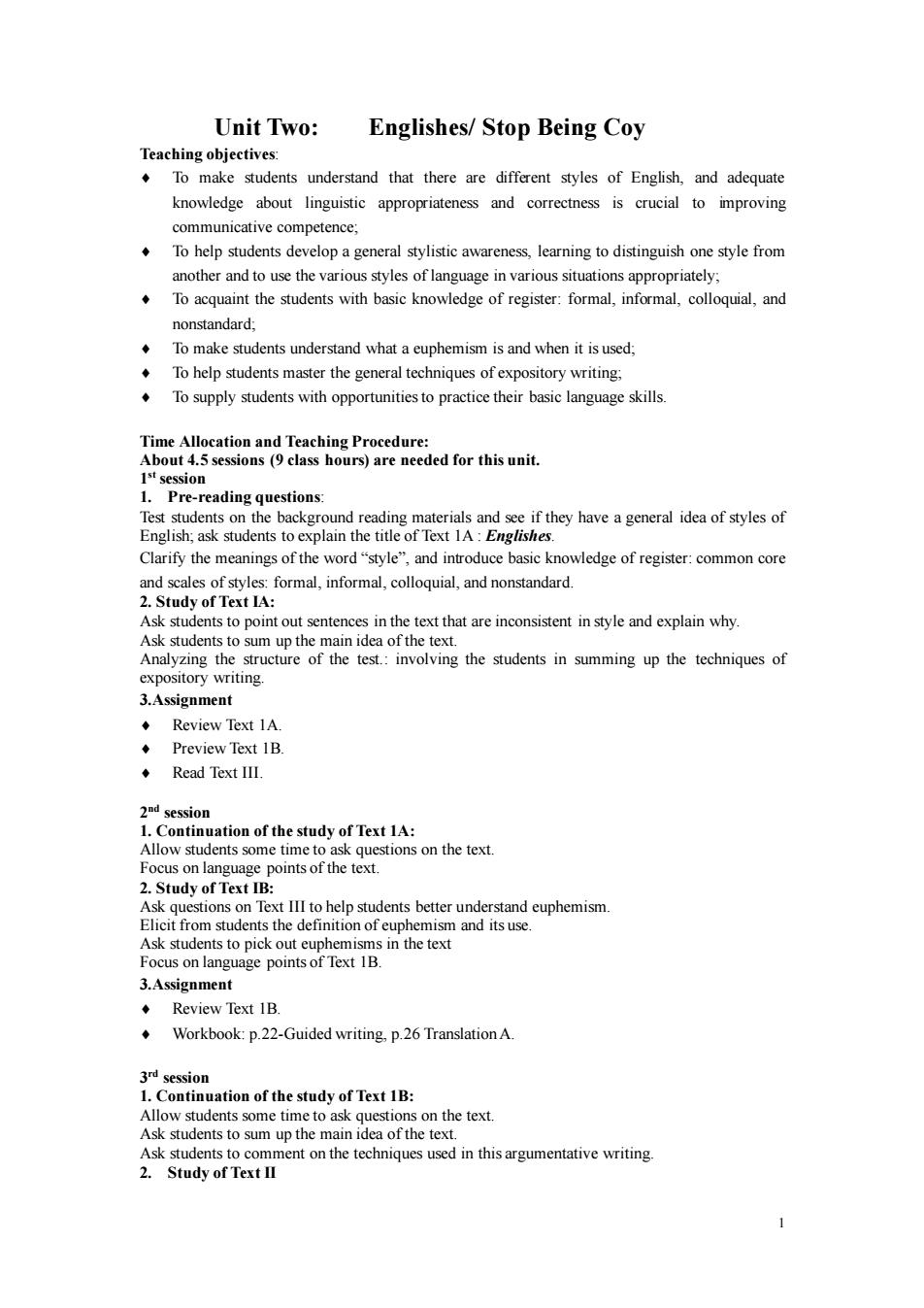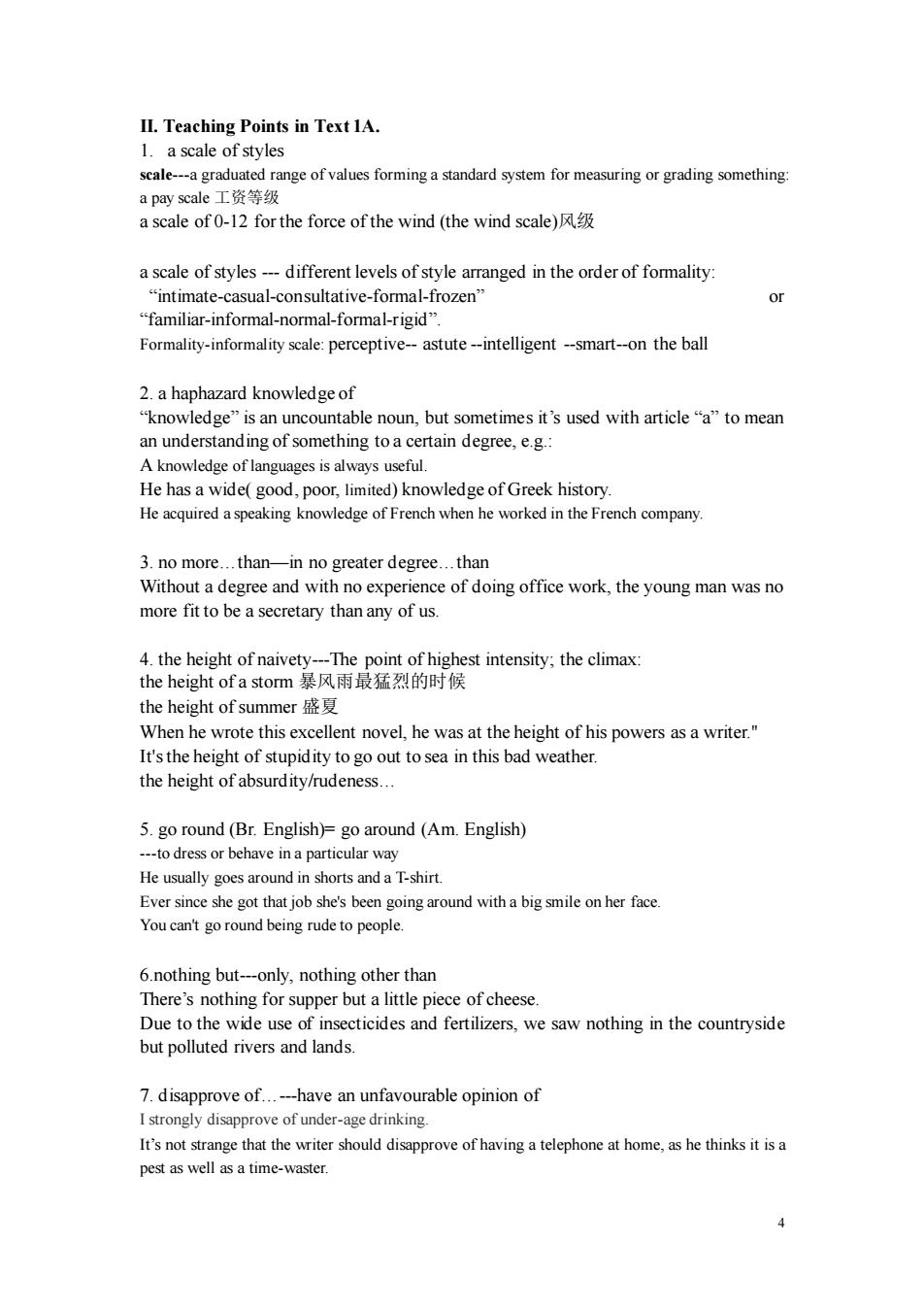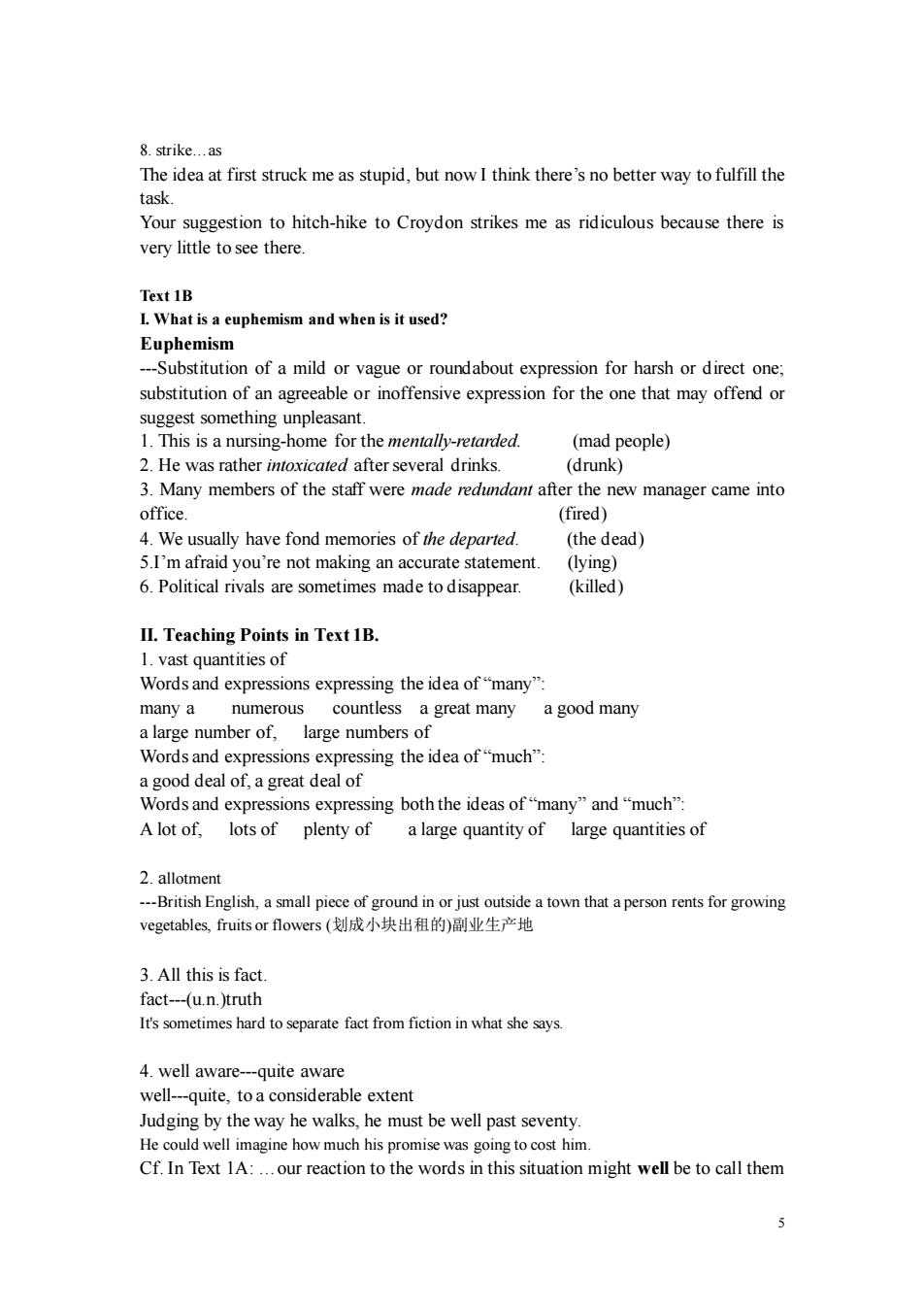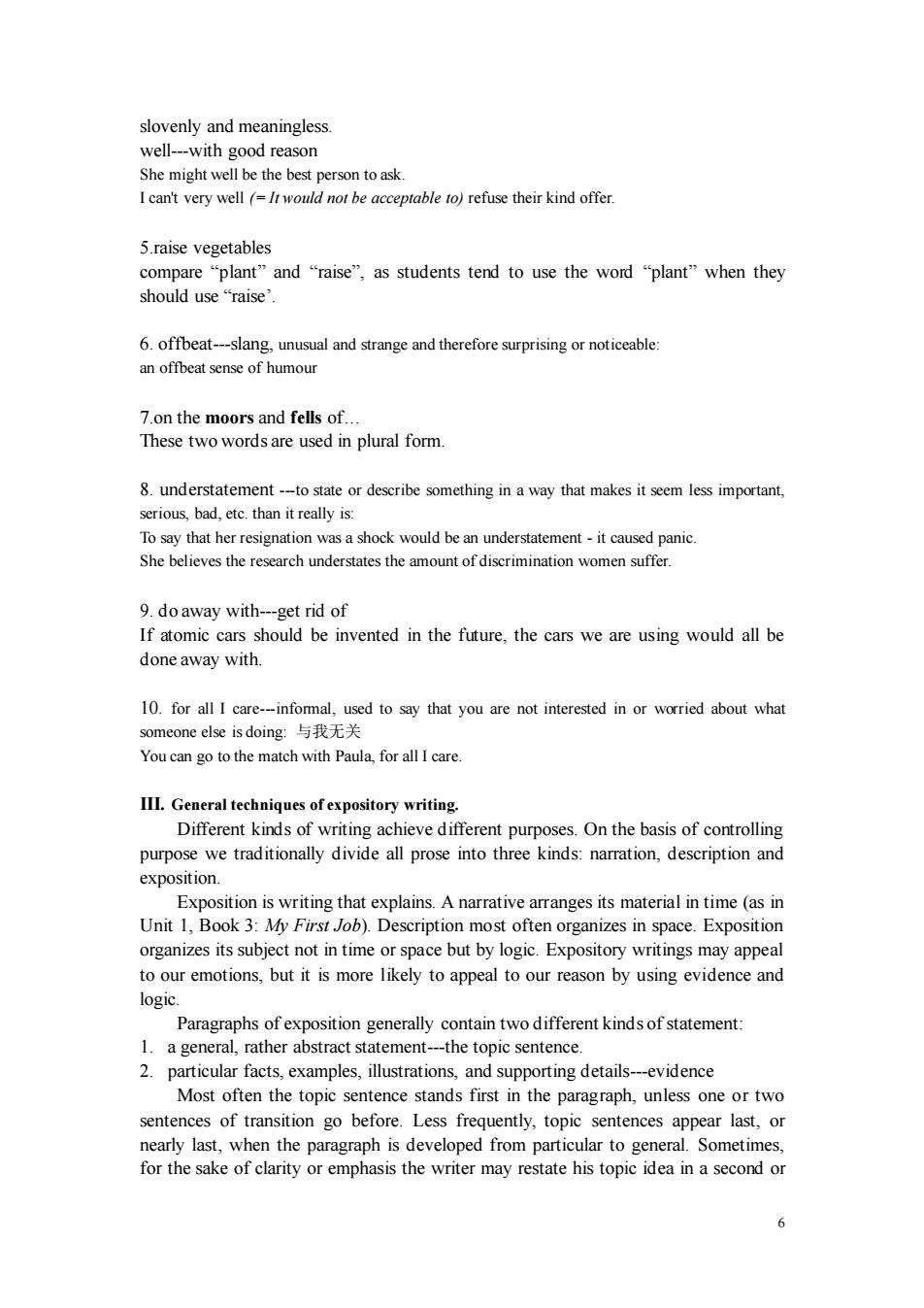
Unit Two: Englishes/Stop Being Coy Teaching objectives: To make students understand that there are different styles of English.and adequate knowledge about linguistic appropriateness and correctness is crucial to improving communicative competence Tohelp students developa general stylistic awareness,earning to distinguishonesty from another and to use the various styles of language in various situations appropriately: To acquaint the students with basic knowledge of register:formal.informal.colloquial,and nonstandard- To make students understand what a euphemism is and when it is used. To help students mast the general techniques of expository writing. ◆ To supply students with opportunities to practice their basic language skills eded for thisunit. Pre-reading questions Clarify the meanings of the word"style",and introduce basic knowledge of register:common core fo mal,informal,colloquial,and nonstandard. Ask students to point out sentences in the text that are inconsistent in style and explain why. expository writing 3.Assignment Review Text 1A Preview Text 1B Read Text III 2d session Focus on language points of the text stions on the text 2.Study of Text IB: Ask students to pickout euphemisn s in the text Focuson language points of Text IB. ◆Review Text IB. Workbook:p.22-Guided writing,p.26 Translation A. Continuation of the study of Text 1B on the text Ask students to sum up the main idea of the text. nent on the techniques used in this argumentative writing Study of TextI
1 Unit Two: Englishes/ Stop Being Coy Teaching objectives: To make students understand that there are different styles of English, and adequate knowledge about linguistic appropriateness and correctness is crucial to improving communicative competence; To help students develop a general stylistic awareness, learning to distinguish one style from another and to use the various styles of language in various situations appropriately; To acquaint the students with basic knowledge of register: formal, informal, colloquial, and nonstandard; To make students understand what a euphemism is and when it is used; To help students master the general techniques of expository writing; To supply students with opportunities to practice their basic language skills. Time Allocation and Teaching Procedure: About 4.5 sessions (9 class hours) are needed for this unit. 1 st session 1. Pre-reading questions: Test students on the background reading materials and see if they have a general idea of styles of English; ask students to explain the title of Text 1A : Englishes. Clarify the meanings of the word “style”, and introduce basic knowledge of register: common core and scales of styles: formal, informal, colloquial, and nonstandard. 2. Study of Text IA: Ask students to point out sentences in the text that are inconsistent in style and explain why. Ask students to sum up the main idea of the text. Analyzing the structure of the test.: involving the students in summing up the techniques of expository writing. 3.Assignment Review Text 1A. Preview Text 1B. Read Text III. 2 nd session 1. Continuation of the study of Text 1A: Allow students some time to ask questions on the text. Focus on language points of the text. 2. Study of Text IB: Ask questions on Text III to help students better understand euphemism. Elicit from students the definition of euphemism and its use. Ask students to pick out euphemisms in the text Focus on language points of Text 1B. 3.Assignment Review Text 1B. Workbook: p.22-Guided writing, p.26 Translation A. 3 rd session 1. Continuation of the study of Text 1B: Allow students some time to ask questions on the text. Ask students to sum up the main idea of the text. Ask students to comment on the techniques used in this argumentative writing. 2. Study of Text II

Call students'attention to the differences between British English and American English. 4.Assignment Review Unit2. Workbook:pp.28-34:Exercises V and VI 4hand 4.5th session 1.Allow students some time to ask questions on this unit. 2.Workbook:pp.28-34:Exercises V and VL Focus on Exercises VA and VI-Help students master the synonyms and understand the 3.Assignment ◆Review Unit2 Written work:Workbook:p.27 Translation B. Preview Unit 4,including background readings Teaching Plan: Text 1A L.About“style” Different definitions of style 1.Style as linguistic choice:Saying the right thing in the most effective way Proper words in proper places makes the true definition of a style. -Jonathan Swift 2.Style may refer to some or all of the language habits of one person:identified with an individual's perso The style is the man himself Georges-Louis de Buffon The style of a writer is a faithful representative of his mind;therefore,if any man would write in a clear style,let him first be clear in his thoughts;and if any man would write in a noble style,let him first possess a noble soul. -Goethe 'the style of Dickens,of Hemingway." 3.Style as period characteristics style may refer to some or all of the language habits shared by a group of people at one time,or over a period of time,as when we talk about the style of Old English heroic poetry,Realistic novels,early 18th century style,the style of Victorian novel, 4.Style as genre:the way language is used in a particular genre:"epistolary style" 信体,poetic style,journalistic style,the style of advertising,etc. s linguistic choice:Saying the right thing in the most effective way
2 Call students’ attention to the differences between British English and American English. 3. Workbook: p.22-Guided writing, p.26 Translation A. 4.Assignment Review Unit 2. Workbook: pp.28-34: Exercises V and VI. 4 th and 4.5th session 1.Allow students some time to ask questions on this unit. 2.Workbook: pp.28-34: Exercises V and VI. Focus on Exercises VA and VI-Help students master the synonyms and understand the appropriate responses to the given situations. 3.Assignment Review Unit 2. Written work: Workbook: p.27 Translation B. Preview Unit 4, including background readings. Teaching Plan: Text 1A I. About “style” . Different definitions of style: 1. Style as linguistic choice: Saying the right thing in the most effective way. Proper words in proper places makes the true definition of a style. -Jonathan Swift 2. Style may refer to some or all of the language habits of one person: identified with an individual’s personality. “The style is the man himself.” - Georges-Louis de Buffon The style of a writer is a faithful representative of his mind; therefore, if any man would write in a clear style, let him first be clear in his thoughts; and if any man would write in a noble style, let him first possess a noble soul. -Goethe ‘the style of Dickens, of Hemingway.” 3. Style as period characteristics style may refer to some or all of the language habits shared by a group of people at one time, or over a period of time, as when we talk about the style of Old English heroic poetry, Realistic novels, early 18th century style, the style of Victorian novel, etc. 4. Style as genre: the way language is used in a particular genre: “epistolary style”,书 信体, poetic style, journalistic style, the style of advertising, etc. Focus: Style as linguistic choice: Saying the right thing in the most effective way

There is a relationship between a given situation and the language used in it.In er should ve ad dequate social awarene ss of the lang linguistic manners for the different types of situation in whicl language is used.(linguistic adaptability) Use different registers as seen appropriate,e.g.the following 7 sentences are different ways of asking the time: Excuse me.could you tell me the right time,please? 23 What t time is it 4.How's the enemy? 5 Time? 6.How much longer have we got? 7.My watch seems to have stoppe Register Common core and Formality-informality scale 1.horse-steed-charger-courser-palfrey 2.infml fml leave depart quit resign cut down reduce fire/sack dismiss identica building edifice fire conflagration 3.go to the lavatory sh n owder my face answer the nature's call. to do wee wee want a wee take a leak/go for a leak urinate 4. A:I require your attendance to be punctual. B:I want you to cone on time 5. A:Could I have everyone's attention,please? B:You guys shut up
3 There is a relationship between a given situation and the language used in it. In communication, the speaker should have adequate social awareness of the language -the appropriate linguistic manners for the different types of situation in which language is used. (linguistic adaptability) Use different registers as seen appropriate, e.g. the following 7 sentences are different ways of asking the time: 1. Excuse me, could you tell me the right time, please? 2. What time is it please? 3. What’s the time? 4. How’s the enemy? 5. Time? 6. How much longer have we got? 7. My watch seems to have stopped. Register Common core and Formality-informality scale 1. horse-steed-charger-courser-palfrey 2. infml fml leave depart quit resign cut down reduce fire/sack dismiss same identical building edifice fire conflagration 3. go to the lavatory wash my hands/powder my face where’s the ladies? answer the nature’s call. to do wee wee want a wee take a leak/ go for a leak urinate 4. A: I require your attendance to be punctual. B: I want you to cone on time. 5. A: Could I have everyone‘s attention, please? B: You guys shut up

II.Teaching Points in Text IA. 1 a scale of styles range of values forming a standard system for measuring or grading something a pay scale工资等级 a scale of o-12 for the force of the wind (the wind scale) a scale of styles different levels of style arranged in the order of formality: intimate-casual consultative-formal-frozen' “familiar-informal-normal-formal-rigid”. Formality-informality scale:perceptive-astute-intelligent-smart-on the ball 2.a haphazard knowledge of dge"is an uncountable noun,but sometimes it's used with article"a"to mean an understanding of something to a certain degree,e.g.: A knowledge of languages is always useful. He has a wide(good,poor,limited)knowledge of Greek history. He acquired a speaking knowledge of Fren whn he orked in the Frenc company 3.no more.than-in no greater degree.than Without a degree and with no experience of doing office work,the young man was no more fit to be a secretary than any of us. of highest intensity,the climax of a storm the height of summer盛夏 When he wrote this excellent novel,he was at the height of his powers as a writer." It'sthe height of stupidity to go out to sea in this bad weather. the height of absurdity/rude 5.go round(Br.English)=go around(Am.English) -to dress or behave in a particular way He usually goes around in shorts and a T-shirt. Ever since she got that job she's been going around with a big face You can't goro eing rude to people 6.nothing but-only,nothing other than There's nothing for supper but a little piece of cheese. Due to the wide use of insecticides and fertilizers,we saw nothing in the countryside and lands 7.disapprove of.-have an unfavourable opinion of I strongly disapprove of under-age drinking. It's not strange that the writer should disapprove of having a telephone at home,as he thinks it is a pest as well as a time-waster. 4
4 II. Teaching Points in Text 1A. 1. a scale of styles scale-a graduated range of values forming a standard system for measuring or grading something: a pay scale 工资等级 a scale of 0-12 for the force of the wind (the wind scale)风级 a scale of styles - different levels of style arranged in the order of formality: “intimate-casual-consultative-formal-frozen” or “familiar-informal-normal-formal-rigid”. Formality-informality scale: perceptive- astute -intelligent -smart-on the ball 2. a haphazard knowledge of “knowledge” is an uncountable noun, but sometimes it’s used with article “a” to mean an understanding of something to a certain degree, e.g.: A knowledge of languages is always useful. He has a wide( good, poor, limited) knowledge of Greek history. He acquired a speaking knowledge of French when he worked in the French company. 3. no more.than—in no greater degree.than Without a degree and with no experience of doing office work, the young man was no more fit to be a secretary than any of us. 4. the height of naivety-The point of highest intensity; the climax: the height of a storm 暴风雨最猛烈的时候 the height of summer 盛夏 When he wrote this excellent novel, he was at the height of his powers as a writer." It's the height of stupidity to go out to sea in this bad weather. the height of absurdity/rudeness. 5. go round (Br. English)= go around (Am. English) -to dress or behave in a particular way He usually goes around in shorts and a T-shirt. Ever since she got that job she's been going around with a big smile on her face. You can't go round being rude to people. 6.nothing but-only, nothing other than There’s nothing for supper but a little piece of cheese. Due to the wide use of insecticides and fertilizers, we saw nothing in the countryside but polluted rivers and lands. 7. disapprove of.-have an unfavourable opinion of I strongly disapprove of under-age drinking. It’s not strange that the writer should disapprove of having a telephone at home, as he thinks it is a pest as well as a time-waster

8.strike.as The idea at first struck me as stupid,but nowI think there's no better way to fulfill the task. Your suggestion to hitch-hike to Croydon strikes me as ridiculous because there is very little to see there. Text1B L What is a euphemism and when is it used? Euphemism -Substitution of a mild or vague or roundabout expression for harsh or direct one; substitution of an agreeable or inoffensive expression for the one that may offend or suggest someth ing unpleasal This is a nursing-home for the mentally-retarded. (mad people) 2.He was rather intoxicated after several drinks. (drunk) 3.Many members of the staff were made redundant after the new manager came into office (fired) 4.We usually have fond m mories of the departed the dead) 5.I'm afraid you're not making an accurate statement. ying】 6.Political rivals are sometimes made to disappear. (killed) II.Teaching Points in Text 1B. eay many a numerous countless a great many a good many a large number of,large numbers of Words and expressions expressing the idea of"much" aeoadadotasetndunmn expres ssing both the ideas of“many”and“much A lot of, lots of plenty of a large quantity of large quantities of 2.allotment -British English,a small piece of ground in or just outside a town that a person rents for growing vegetables,.fruitsor fowers(划成小块出程的)副业生产地 3.All this is fact. fact-(u.n.)truth It's sometimes hard to separate fact from fiction in what she says 4.well aware quite aware well-quite,toa considerable extent Judging by the way he walks,he must be well past seventy. He could well imagine how much his promise was going to cost him. Cf.In Text 1A:.our reaction to the words in this situation might well be to call them
5 8. strike.as The idea at first struck me as stupid, but now I think there’s no better way to fulfill the task. Your suggestion to hitch-hike to Croydon strikes me as ridiculous because there is very little to see there. Text 1B I. What is a euphemism and when is it used? Euphemism -Substitution of a mild or vague or roundabout expression for harsh or direct one; substitution of an agreeable or inoffensive expression for the one that may offend or suggest something unpleasant. 1. This is a nursing-home for the mentally-retarded. (mad people) 2. He was rather intoxicated after several drinks. (drunk) 3. Many members of the staff were made redundant after the new manager came into office. (fired) 4. We usually have fond memories of the departed. (the dead) 5.I’m afraid you’re not making an accurate statement. (lying) 6. Political rivals are sometimes made to disappear. (killed) II. Teaching Points in Text 1B. 1. vast quantities of Words and expressions expressing the idea of “many”: many a numerous countless a great many a good many a large number of, large numbers of Words and expressions expressing the idea of “much”: a good deal of, a great deal of Words and expressions expressing both the ideas of “many” and “much”: A lot of, lots of plenty of a large quantity of large quantities of 2. allotment -British English, a small piece of ground in or just outside a town that a person rents for growing vegetables, fruits or flowers (划成小块出租的)副业生产地 3. All this is fact. fact-(u.n.)truth It's sometimes hard to separate fact from fiction in what she says. 4. well aware-quite aware well-quite, to a considerable extent Judging by the way he walks, he must be well past seventy. He could well imagine how much his promise was going to cost him. Cf. In Text 1A: .our reaction to the words in this situation might well be to call them

slovenly and meaningless well-with good reason She might well be the best person to ask. I can't very well(-It would not be acceptable to)refuse their kind offer. 5 raise vegetables are "plan and“raise”,as students tend to use the word“"plant'”when they should use“raise 6.offbeat-slang,unusual and strange and therefore surprising or noticeable: an offbeat sense of humour 7.on the moors and fells These two words are used in plural form 8.understatement-to state or describe something in a way that makes it seem less important, serious,bad,etc.than it really is To say that her resig as a shock would be an unde rstatement-it caused panic She believes the research understates the amount of discrimination women suffer 9.doaway with-get rid of If atomic cars should be invented in the future,the cars we are using would all be done away with. 10.for all I care-infommal,used to say that you are not interested in or worried about what someone else isdoing:与我无关 You can go to the match with Paula.for all I care II.General ofexpositorywritin Different kinds of writing achieve different purposes.On the basis of controlling purpose we traditionally divide all prose into three kinds:narration,description and exposition. Exposition is writing that explains.A narrative arranges its material in time(s in Unit 1,Book 3:My Firs orga nizes in space.Expositio organizes its subject not in time or space but by logic.Expository writings may appea to our emotions,but it is more likely to appeal to our reason by using evidence and logic. Paragraphs of exposition generally contain two different kindsof statement: 1.a gener ral rathe nt-the t 2.particular facts,examples,illustrations,and supporting details-evidence Most often the topic sentence stands first in the paragraph,unless one or two sentences of transition go before.Less frequently,topic sentences appear last,or nearly last,when the paragraph is developed from particular to general.Sometimes. for the sake of clarity or emphasis the writer may restate his topic idea in a second or
6 slovenly and meaningless. well-with good reason She might well be the best person to ask. I can't very well (= It would not be acceptable to) refuse their kind offer. 5.raise vegetables compare “plant” and “raise”, as students tend to use the word “plant” when they should use “raise’. 6. offbeat-slang, unusual and strange and therefore surprising or noticeable: an offbeat sense of humour 7.on the moors and fells of. These two words are used in plural form. 8. understatement -to state or describe something in a way that makes it seem less important, serious, bad, etc. than it really is: To say that her resignation was a shock would be an understatement - it caused panic. She believes the research understates the amount of discrimination women suffer. 9. do away with-get rid of If atomic cars should be invented in the future, the cars we are using would all be done away with. 10. for all I care-informal, used to say that you are not interested in or worried about what someone else is doing: 与我无关 You can go to the match with Paula, for all I care. III. General techniques of expository writing. Different kinds of writing achieve different purposes. On the basis of controlling purpose we traditionally divide all prose into three kinds: narration, description and exposition. Exposition is writing that explains. A narrative arranges its material in time (as in Unit 1, Book 3: My First Job). Description most often organizes in space. Exposition organizes its subject not in time or space but by logic. Expository writings may appeal to our emotions, but it is more likely to appeal to our reason by using evidence and logic. Paragraphs of exposition generally contain two different kinds of statement: 1. a general, rather abstract statement-the topic sentence. 2. particular facts, examples, illustrations, and supporting details-evidence Most often the topic sentence stands first in the paragraph, unless one or two sentences of transition go before. Less frequently, topic sentences appear last, or nearly last, when the paragraph is developed from particular to general. Sometimes, for the sake of clarity or emphasis the writer may restate his topic idea in a second or

third sentence and again at the end of a paragraph.With or without restatement the expository wr usually moves from topic sentence to supporting details,from general to particular Elicit from students the writing purposes of texts 1A and 1B,the topic sentence of each paragraph and what particular details are used to support the topic sentence. 7
7 third sentence and again at the end of a paragraph. With or without restatement the expository writer usually moves from topic sentence to supporting details, from general to particular. Elicit from students the writing purposes of texts 1A and 1B, the topic sentence of each paragraph and what particular details are used to support the topic sentence